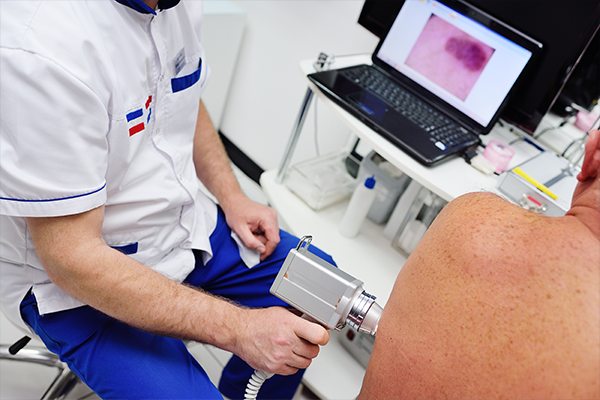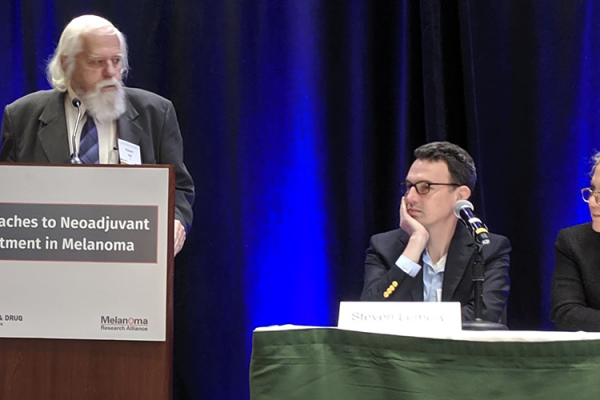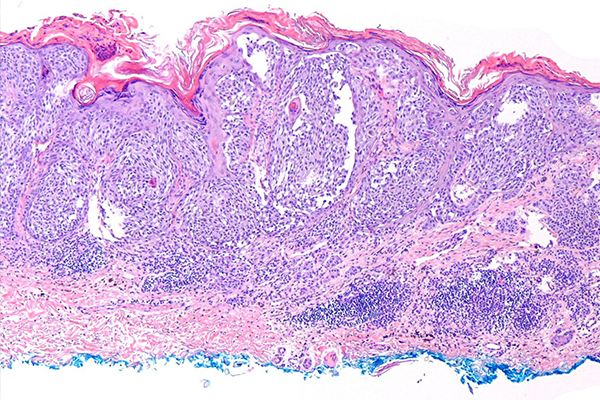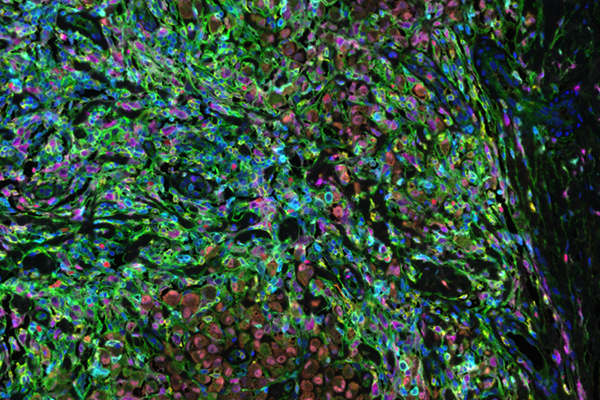Category: Science
Combination Therapy: Why Timing Might Be Everything
By Rachel Fischer, Ph.D., Associate Director, Scientific Program & Registry | 13 February 2020 In Science
About half of all melanomas have a mutated BRAF gene. This mutated gene makes an altered BRAF protein, which leads to the uncontrolled growth of melanoma cells. Drugs targeting these altered BRAF proteins, such as Vemurafenib and Dabrafenib have been approved for the treatment of BRAF+ melanoma.
Clinical Trials to Watch: Intralesional Therapies for Melanoma
By Kristen Mueller, PhD | 8 February 2020 In Science, Treatment
To an outsider, the number of new treatment options for melanoma may seem to be moving at a breakneck pace. Checkpoint immunotherapy and BRAF/MEK inhibitors have greatly improved outcomes for many late-stage melanoma patients, with over 50% of patients on combination ipilimumab/nivolumab still alive after 5 years.
Stage 4 Melanoma, a Vaccine Clinical Trial, and the Power of Family & Faith
By Cody Barnett, MPH, MRA Senior Director of Communications & Patient Engagement | 7 February 2020 In Melanoma Stories, Science, Treatment
“Clinical trials allow you to take advantage of the latest research and experiences from doctors and patients who’re blazing the trails. Clinical trials are also a way for you to help the next person who is going to have to go through this. If you have the opportunity to be part of something that helps others, why wouldn’t you at least try it?”
Melanoma Research Advances – 2019 in Review
By Marc Hurlbert, PhD, MRA Chief Executive Officer | 27 January 2020 In Policy, Prevention, Science, Treatment
During 2019, melanoma research continued its rapid pace of advancement, with FDA approval of a new adjuvant therapy treatment option, several first-in-human clinical trials, and significant progress towards earlier intervention.
Doubling Down on Rare Melanomas
16 December 2019 In Science
Acral, uveal, and mucosal melanoma – known collectively as ‘rare melanomas’ – represent a type of black hole for the clinical community. We know far less about them—what causes them, how they progress, and how to effectively treat them.
Approaches to Neoadjuvant Treatment in Melanoma: A Public Workshop Organized by the FDA and MRA
13 November 2019 In Events, Science, Treatment
On November 6, 2019, the FDA and the Melanoma Research Alliance co-hosted a public workshop to identify, discuss, and address key issues, challenges and opportunities in the pursuit of neoadjuvant therapies for patients with surgically resectable melanoma. This exciting, half-day workshop brought together clinicians, researchers, regulators, and patient advocates to explore opportunities and discuss challenges in the development of neoadjuvant therapies for melanoma. The workshop took place at National Harbor (outside of Washington, D.C.) with opportunities to participate in person and via simultaneous webcast.
Mutations and Melanoma
By Cody Barnett, MPH, MRA Senior Director of Communications & Patient Engagement | 8 November 2019 In Science
Cancer is caused by mutations in our DNA that allow cells to grow uncontrollably – and eventually invade surrounding tissue. Melanoma is a specific type of cancer that is formed in pigment-containing cells, known as melanocytes, which are found primarily in the skin but also in places like the eye and on mucous membranes. Thanks to advancements in research, the same mutations that cause cancer are proving helpful in treating it.
Bob Enrolls in Clinical Trial Testing NeoAdjuvant Therapy for Melanoma
By Cody Barnett, MPH, MRA Senior Director of Communications & Patient Engagement | 2 November 2019 In Melanoma Stories, Science, Treatment
After being diagnosed with Stage 3 melanoma, Bob chose to enroll in a clinical trial at Georgetown University, comparing the effectiveness of treating melanoma with pembrolizumab before or after surgery, what doctors call neo-adjuvant and adjuvant therapy respectively.
MRA is Raising the Treatment Bar
31 October 2019 In Allies & Partnerships, Melanoma Stories, Science, Treatment
We have made unprecedented progress that is transforming what it means to be diagnosed with melanoma. Today, we have more treatment options than ever before—in fact 12 new options have earned FDA approval since MRA's founding. But, it's still not enough.
Imaging the Immune Response in Melanoma
7 October 2019 In Science
We are fortunate to now have effective immune therapies for many melanoma patients. But unfortunately, we also now know that these treatments can often cause serious side effects, like diabetes and colitis, among other reactions. Consequently, there has been a push to develop a way to detect early on if...










